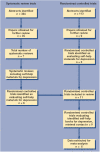Self-help books for depression: how can practitioners and patients make the right choice?
- PMID: 15904559
- PMCID: PMC1463163
Self-help books for depression: how can practitioners and patients make the right choice?
Abstract
Background: Depression is a common and important public health problem most often treated by GPs. A self-help approach is popular with patients, yet little is known about its effectiveness.
Aim: Our primary aim was to review and update the evidence for the clinical effectiveness of bibliotherapy in the treatment of depression. Our secondary aim was to identify which of these self-help materials are generally available to buy and to examine the evidence specific to these publications.
Method: Medline, CINAHL, EMBASE, PsycINFO, CCTR, PsiTri and the National Research Register were searched for randomised trials that evaluated self-help books for depression which included participants aged over 16 years with a diagnosis or symptoms of depression. Clinical symptoms, quality of life, costs or acceptability to users were the required outcome measures. Papers were obtained and data extracted independently by two researchers. A meta-analysis using a random effects model was carried out using the mean score and standard deviation of the Hamilton Rating Scale for Depression at the endpoint of the trial.
Results: Eleven randomised controlled trials were identified. None fulfilled CONSORT guidelines and all were small, with the largest trial having 40 patients per group. Nine of these evaluated two current publications, Managing Anxiety and Depression (UK) and Feeling Good (US). A meta-analysis of 6 trials evaluating Feeling Good found a large treatment effect compared to delayed treatment (standardised mean difference = -1.36; 95% confidence interval [CI] = -1.76 to -0.96). Five self-help books were identified as being available and commonly bought by members of the public in addition to the two books that had been evaluated in trials.
Conclusion: There are a number of self-help books for the treatment of depression readily available. For the majority, there is little direct evidence for their effectiveness. There is weak evidence that suggests that bibliotherapy, based on a cognitive behavioural therapy approach is useful for some people when they are given some additional guidance. More work is required in primary care to investigate the cost-effectiveness of self-help and the most suitable format and presentation of materials.
Figures
Comment in
-
Review: Some evidence shows that self help books based on cognitive behaviour therapy can relieve depression in some patients.Evid Based Med. 2006 Feb;11(1):8. doi: 10.1136/ebm.11.1.8. Evid Based Med. 2006. PMID: 17213050 No abstract available.
References
-
- NHS Centre for Reviews & Dissemination. Improving the recognition and management of depression in primary care. Effective Health Care. 2002:7.
-
- Churchill R, Hunot V, Corney R, et al. A systematic review of controlled trials of the effectiveness and cost-effectiveness of brief psychological treatments for depression. Health Technol Assess. 2001;5(35) www.ncchta.org/projectdata/1_project_record_published.asp?PjtId=1003&Sea... (accessed 6 Apr 2005) - PubMed
-
- Kaltenhaler E, Shackley P, Stevens K, et al. A systematic review and economic evaluation of computerised cognitive behaviour therapy for depression and anxiety. London: Department of Health; 2002. The NHS Health Technology Assessment Programme Volume 6 number 22 www.ncchta.org/ProjectData/3_project_record_published.asp?PjtId=1254 (accessed 30 Mar 2005) - PubMed
-
- McKendree-Smith NL, Floyd M, Scogin FR. Self-administered treatments for depression: a review. Journal of Clinical Psychology. 2003;59:275–288. - PubMed
-
- Scogin F, Bynum J, Stephens G. Efficacy of self-administered treatment programs: meta-analytic review. Prof Psychol Res Pract. 1990;21:42–47.
Publication types
MeSH terms
LinkOut - more resources
Full Text Sources
Medical


